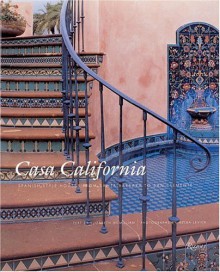The Spanish-style architecture of Southern California's seaside estates, canyon villas, and courtyard bungalows is central to its romantic image, one that has traditionally evoked a Mediterranean paradise. The details of this inexhaustively rich style-- ornate wrought iron and wood balconies,...
show more
The Spanish-style architecture of Southern California's seaside estates, canyon villas, and courtyard bungalows is central to its romantic image, one that has traditionally evoked a Mediterranean paradise. The details of this inexhaustively rich style-- ornate wrought iron and wood balconies, colorful tiles, graceful arches, and palm-dotted gardens-- reflect the region's Spanish, Mexican, and southwestern history and culture as well as its popular outdoor lifestyle. This book showcases Southern California's most historically significant and beautifully preserved Spanish-revival houses of this century. Twenty-one private homes built between 1922 and 1991 are featured in stunning color photography that captures exterior and interior architectural details, Spanish and Mexican antique furnishings and folk art, and lush landscaping and tiled fountains. Among these are the Adamson House in Malibu, with its extraordinary collection of custom tile from Malibu Potteries; the contemporary Greenberg House in Brentwood, by Ricardo Legorreta; The Andalusia Courtyard Apartments in Hollywood; and Casa Pacifica, the former home of Richard Nixon, overlooking the ocean in San Clemente. Brief narratives highlight the history of each building and its design influences on the Spanish-revival movement in California. The Spanish revival grew in popularity around the turn of the century when many young American architects traveled to Spain, Italy, and Mexico, bringing back sketches and, as the foreword notes, romantic memories of "graceful foliage...small Indian towns...tiled dome and rococo towers." Hundreds of Spanish-style houses, apartments, and bungalows were built throughout Southern Californiain the following decades, many of them commissioned for movie stars such as Charlie Chaplin and Rudolph Valentino. The Spanish revival is marked by two main phases: the mission revival, which incorporates the white stucco, cloistered patios, tile roofs, and exposed-beam ceilings typical of eighteenth-century California missions; and the more elaborate Mediterranean revival, influenced by Spanish and Italian Renaissance sources, eighteenth-century Spanish plateresque and churrigueresque forms, and Moorish-Andalusian styles.
show less

